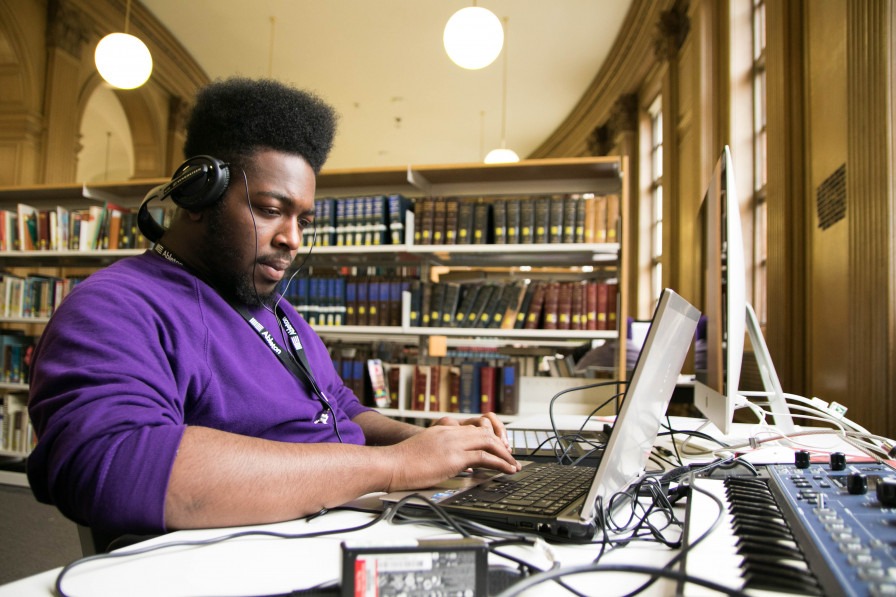The modern world of music facilitation

In November last year, Arc and Brighter Sound brought together freelancers and organisations for a series of workshops exploring online music facilitation and wellbeing. Here Phill Howley (Arc) and Lucy Wallace (Brighter Sound) reflect on their experience, and share some unexpected learnings.
When the pandemic first hit back in March 2020, music facilitators were suddenly working in a completely new and fast changing environment, with all of their sessions shifting online. Out of nowhere there was an immediate need to learn a whole new set of skills, often in isolation.
Lots of freelancers, and organisations like ours, were having to experiment and try different things. In our conversations, we were getting more and more questions about how to operate in this strange new world. Some of what was needed was really practical support, like what kind of software and resources to use, how to use them, and how to safeguard young people online. However, we soon realised that everyone had started to develop quite distinct approaches to how they’d been delivering online.
It was becoming apparent that we needed to address something: ‘How can we continue to inspire and support young people, and each other, in an online environment while staying safe and well? And what makes these music sessions high quality?’
To explore these issues, we put together a six-part series of online workshops for facilitators. We really didn’t want to position ourselves as the ‘experts’, but instead create a space where everyone (both speakers and attendees) could interact, share learning, and feel part of a wider community.
We knew that providing support around mental health and wellbeing, particularly for those working with young people, was more necessary than ever. With the common theme of music and wellbeing in an online setting, each workshop had a specific training focus. Some were broad (like safeguarding) and some had a more specialist focus (like music in hospital settings).
We wanted to get as many people’s voices heard from across the sector, and felt it was important to have a range of perspectives. We had speakers from seven organisations across the North West: Arc, Brighter Sound, 42nd Street, More Music, Lime Arts, BIMM and Jessie’s Fund, and attendees from across the North West and beyond, as far as Plymouth, Belfast and Edinburgh, and representing 17 organisations.
Read our collective 10 top tips for high quality online delivery
The workshops were a great example of how partnership working can expand your networks and be a wonderful jumping off point for future work together. Connecting with others on an individual level, but also with the sector as a whole, was a huge benefit to everyone involved. As organisations we’re often busy delivering, so we’re not always in a position to see other people’s work or hear their stories. It really made what can be quite a disparate sector feel connected.
[These workshops] helped me immensely, especially with the transition to moving some of my workshops online. [They] also helped me to stay motivated and value the work that I do.
In these times of isolation, it was really nice to feel part of a community.
Working in isolation, especially online, can be very challenging. One of the main, and unexpected, outcomes of the facilitation workshops was the way in which people reported how their own wellbeing had improved since attending. In fact this is one of the things people still talk to us about. Just being able to have open and honest conversations and hear about how others are dealing with the challenges of online delivery. And then knowing that those peers are there to continue those conversations outside of the session if you need to, is so important.
I found the emphasis on our own well-being as teachers really useful too and to swathe all our education work in gentle ‘looking-after-ourself’ practices to give [young people] the best possible learning experience online.
It was great! Really valuable in this difficult time for keeping a sense of my identity as a musician and socially engaged practitioner. Thank you.
We believe these kinds of opportunities for facilitators are vital. They enable individuals to feel more confident and resilient in their online delivery, building a toolbox of skills and resources, and a supportive community. As a result more young people have access to enriching, engaging and stimulating online music making opportunities.
As we start to return to face-to-face activity in the coming months, it is really important to recognise both the challenges but also the benefits of working online. As we look to reach those who can’t or have chosen not to interact online, we should also seek to maintain the increased participation of those for whom additional barriers such as geography and social anxiety have been lessened by online working.
New hybrid models of practice, combining online and face-to-face music making, could be a really positive outcome after the disruption of the past year, forever changing the way we deliver inclusive music making opportunities.
If you’re interested in opportunities to connect with other facilitators or organisations, check out the Brighter Sound Practitioners Network on Facebook.

